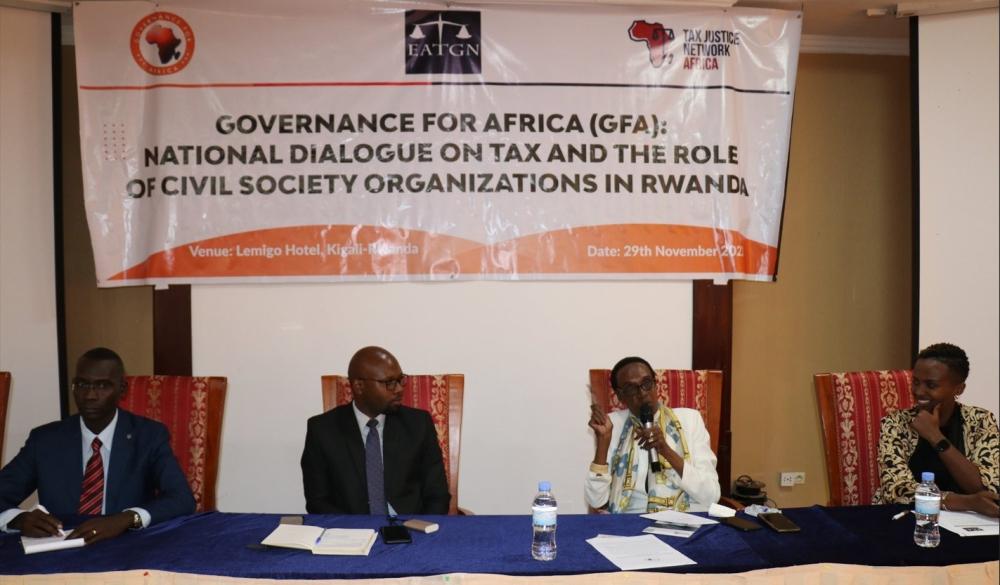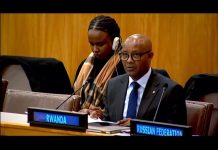Africa-Press – Rwanda. Civil Society Organisations (CSOs) have called on the Government to consider more participation of citizens in the process to set taxes so that they are based on their capacity to pay, and respond better to priority needs.
They made the proposal on Tuesday, November 29, in Kigali, while Governance for Africa (GFA) and its partners hosted the National Dialogue on taxation and role of Civil Society Organisations in Rwanda.
This dialogue was aimed at emphasising engagement and capacity building among CSOs in Rwanda around critical areas of double taxation agreements, tax policies, national debts, and new tax laws.
Marie Immaculée Ingabire, Chairperson of Transparency International Rwanda, said that taxes have an important role in the development of the country, but argued that the civil society is not consulted and the participation of taxpayers in the tax setting process was very limited.
“You wake up and see a law enacted,” she said, citing the “land tax rates that were beyond citizens’ ability to pay”.
The land taxes are provided for in the law determining the sources of revenue and property of decentralised entities – known as property tax law – that was published in 2018.
With this law, the tax rate on a parcel of land was capped at Rwf300 per square metre from Rwf80 previously, implying that taxes more than tripled in some cases.
“We know the role of taxes, we also know that developed countries were able to achieve that status as a result of the taxes paid by their citizens… But, in taxation policy, you also consider the taxpayers’ financial means,” Ingabire said.
She indicated that if civil organisations are effectively involved in the tax setting process and understanding the laws and their purposes, they have the ability to explain them to the residents in a more comprehensive way, because they have close connections with them.
“We have more needs that cannot be fully met with the taxes paid by Rwandans, which then implies, we should consider and agree on priorities. Indeed, for the citizen to pay taxes with satisfaction, you should show them the benefits they have in that,” she said, citing ambulances that help to transport patients and pregnant mothers to hospital for health services, as one of the things that people commonly need.
Cyrus Munyaburanga Nkusi, Chief Executive Officer of Governance for Africa underscored that it is through taxes that the country’s development is achieved, citing infrastructures, health facilities, schools.
“However, those taxes should correspond to the citizens’ financial capacity, and whether the citizens have a part in determining them. … Tax should not be like a problem, rather a solution,” he said, indicating that citizens can participate in tax setting through their representatives, including those the youth, the people with disabilities, and women, among others.
He called for consultations with the citizens, so that enacted laws are responding to their needs.
“Sometimes, a tax law is passed, yet, the residents did not have participation in it and were not consulted. That is why sometimes, residents are always complaining on social media, and other places, and you find that taxes have become a problem, instead of a solution,” he said.
Abel Ntegano, Director General of Tax Policy at the Ministry of Finance and Economic Planning (MINECOFIN), said that for a bill to be initiated and enacted into law, there first has to be an issue it seeks to address, and the solution it will offer in that regard, indicating that consultations are made with different entities to ensure that their inputs are considered in a draft tax law.
He pointed out that there is a Tax Policy Committee which analyses a tax being initiated, and comprises members from various concerned public institutions, including MINECOFIN, the Rwanda Development Board, the Rwanda Revenue Authority, and the private sector federation.
However, he said that through the above-mentioned meeting, a suggestion was made to see how the civil society can be represented in the Tax Policy Committee, which he said they took note of.
For More News And Analysis About Rwanda Follow Africa-Press






